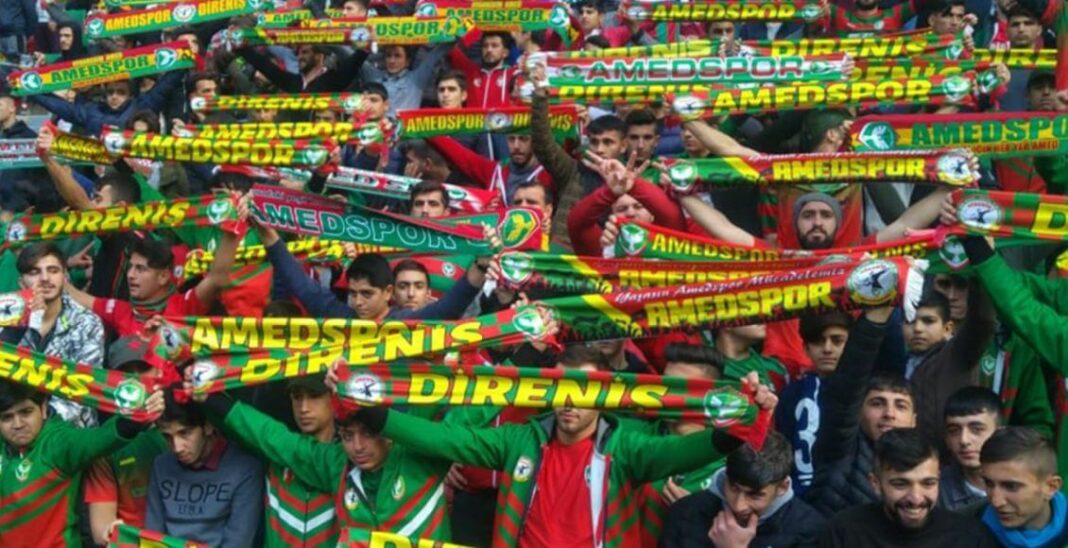The slurs shouted by the ultras of a football club in northwest Turkey at their Kurdish rivals is just one way that the decades-old feud opposing Turks and Kurds plays out in the sport.
While Amedspor is the most popular team among Turkey’s Kurds, who make up about a fifth of the country’s 85 million people, it is the most hated by the rest of the population.
“They are not a team, they are terrorists,” said Efe Kaan Ozkaya, a Sakaryaspor fan, standing with friends outside the Istanbul stadium hosting a second-division football match between his club and Amedspor.
Police officers and armored vehicles flooded the Istanbul neighborhood welcoming the southeast Turkish club.
As the national anthem played, Sakaryaspor supporters made the salute of the Grey Wolves, a far-right group accused of having killed several Kurdish and left-wing activists.
But the game is a precious opportunity for the 200 Amedspor lovers, guarded by 100 police officers, who came to watch their idols — a trip that is frequently banned by authorities over security concerns.
The club’s home city of Diyarbakır, also known as Turkey’s “Kurdish capital,” remains scarred by intense fighting between the army and the Kurdistan Workers’ Party (PKK) in 2015-2016.
The conflict with the PKK — which is considered a terrorist organization by Turkey and its Western allies — has killed more than 40,000 people since 1984.
Many Kurds say they face significant discrimination in the country. Ankara denies the claims, insisting that it does not discriminate against Kurds as a minority but rather opposes the PKK.
‘A form of resistance’
The players sporting white jerseys with red and green stripes — the colors of Kurdistan — began kicking the ball, as fans chanted “Amed! Amed!”, Diyarbakir’s Kurdish name.
Support — and hatred — for the club exploded after 2015, when it changed its name to Amedspor.
Nine years later, “the existence of Amedspor, with its colors and its name, is a very strong and unprecedented form of resistance,” said Dağhan Irak, a sports sociologist.
The Kurds — an ethnic minority who live in mountainous regions spread across Turkey, Syria, Iraq and Iran — have long fought for their own homeland.
The Diyarbakır-based club and its players have faced repeated sanctions, including over calling for the end of operations against the PKK, said Irak.
“Kurds in Turkey are free to live as Kurds privately, as long as they agree to be Turks publicly,” he said.
“Kurds are free to play as long as they do not play as Kurds.”
‘Kurdish national team’
The popular club played in the third division last year in front of crowds averaging 20,000 — more than 17 of the 20 teams in the first division managed to attract.
It was promoted to second division at the end of last season, and still faces attacks with each away fixture.
Teams from Turkey’s Kurdish regions and their supporters have been involved in repeated fights during Turkish league matches.
At a match in the conservative western city of Bursa last year, Amedspor players had objects, including knives, thrown at them.
“Whichever team they face, Amedspor is almost always perceived as representing another country,” Reha Ruhavioğlu, the director of the Center for Kurdish Studies, told AFP.
Although the team’s roster has several non-Kurdish players, identity is a key component of the club.
“Amedspor is to Kurds what Barcelona is to Catalans,” said Uygar Öztürk, 43, after a disappointing score (0-0).
“Amedspor is not just the Diyarbakır team, it is like a national Kurdish team,” said Azer Güneş, a 19-year-old waiter who arrived in İstanbul last spring.
Güneş said he wears his club’s colors everywhere he goes, even more so after Kurdish construction workers were beaten, with one shot, in central Turkey in August for refusing to take off their Amedspor shirts.
Seconds later, fellow fan Uğur Çetin railed at heavy policing.
“We were 200 fans for 2,000 police officers!” he said, adding that he was searched eight times.
“Why so many precautions? That’s because of our race.”



